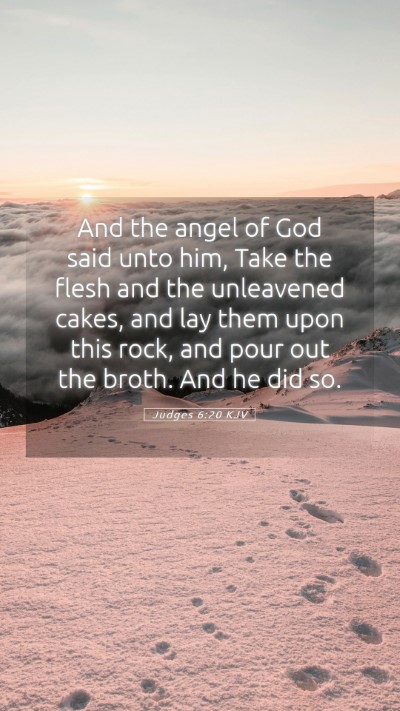Bible Verse Meaning and Commentary on Judges 6:20
In Judges 6:20, the angel of the Lord instructs Gideon to take the flesh and the unleavened cakes and present them upon a rock as an offering. This verse is rich in theological significance and intertwines various themes prevalent in the Book of Judges, such as divine calling, obedience, and sacrificial worship.
Context of Judges 6
This chapter is set during a time when Israel was oppressed by the Midianites. Gideon, the protagonist, is initially doubtful of his own capabilities to lead Israel against this formidable enemy. The appearance of the angel signifies God's direct intervention in Israel’s plight.
Verse Analysis
Judges 6:20 states:
"And the angel of God said unto him, Take the flesh and the unleavened cakes, and lay them upon this rock, and pour out the broth. And he did so."
Key Themes
- Divine Communication: This verse highlights God's intention to communicate directly with His chosen ones. Gideon's encounter clearly demonstrates a personal God engaging with him.
- Obedience and Faith: Gideon's action of bringing forth the offering signals his growing faith and willingness to follow God’s directions, marking a pivotal moment in his journey.
- Sacrificial Worship: The act of presenting flesh and unleavened bread symbolizes dedication and an acknowledgment of God's sovereignty. Unleavened bread is significant in Israelite worship, representing purity and the absence of sin.
Commentary Insights
According to Matthew Henry's Commentary, the angel’s request served both as a test and a preparation for Gideon to receive divine assurance. The use of a rock as the altar emphasizes solid foundations in faith and the permanence of God's promises.
Albert Barnes emphasizes that the unleavened cakes indicate a readiness to offer oneself wholly to God. This readiness is critical for any believer seeking to serve God faithfully.
Adam Clarke's Commentary suggests that the act of pouring broth represents a full immersion and offering of oneself—akin to the believer’s call to present their bodies as living sacrifices (Romans 12:1).
Application in Daily Life
Judges 6:20 teaches the importance of responding to God’s call with obedience and faith. Here are ways to apply the message in today’s context:
- Engage regularly in prayer to discern God’s direction for your life.
- Respond to the opportunities God presents to serve others and witness to His grace.
- Practice sacrificial worship through acts of love and service in your community.
Cross References
This verse can be connected to several other passages that further illuminate its meaning:
- Romans 12:1: "I beseech you therefore, brethren, by the mercies of God, that you present your bodies a living sacrifice, holy, acceptable unto God..."
- Exodus 12:8: "And they shall eat the flesh in that night, roast with fire, and unleavened bread; and with bitter herbs they shall eat it."
- 1 Kings 18:36-37: Elijah’s offering on Mount Carmel is another instance of God responding to sacrificial acts.
Conclusion
Understanding Judges 6:20 is vital for grasping the essence of obedience and faith in our walk with God. Through this verse, we gain insights not only into the historical context of Israel’s struggles but also into the personal journey of every believer called to respond to God’s command. The implications of this verse encourage practical outcomes in the life of faith.
In summary, the verse encapsulates the idea that true engagement with God comes through obedience, sacrifice, and a firm belief in His providence.
Further Study
If you are interested in exploring deeper, consider joining a Bible study group or utilizing online Bible study resources to dive into more Bible verse analyses, using tools like context, commentary, and historical background for better Bible verse understanding.


